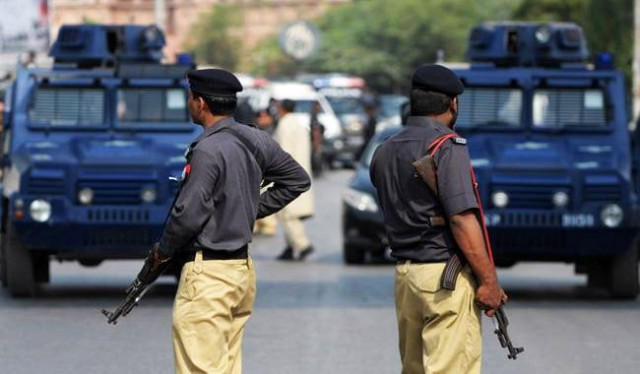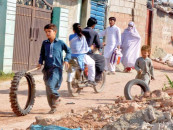Police, judiciary among top corrupt sectors: survey
Sindh police surges to become the most corrupt sector, accounting for 37%

The police department remains the most corrupt while the judiciary sits as the third most corrupt institution in Pakistan, according to a survey released by Transparency International Pakistan (TIP).
According to the National Corruption Perceptions Survey 2023, the police remain the most corrupt sector (30%), tendering and contracting was seen as the second most corrupt (16%) and the judiciary third most corrupt (13%).
Education and health sectors are the fourth and fifth most corrupt sectors, respectively.
Local governments, land administration and customs, excise and income tax are the sixth, seventh and eighth most corrupt institutions, respectively.
According to the report, the provincial breakdown of the three most corrupt sectors reveals the following: In Sindh, police has climbed to become the most corrupt sector (37%), tendering and contracting was seen as the 2nd most corrupt (14%), while education has improved to become the 3rd most corrupt since NCPS 2022 (13%).
Read More: 'System’ blamed for corruption
In Punjab, police continued to remain the most corrupt sector (25%), judiciary (17%) and health (15%) have climbed to become the 2nd and 3rd most corrupt sectors since NCPS 2022.
In Khyber Pakhtunkhwa (K-P), police have climbed to become the most corrupt sector (37%), judiciary (15%) and tendering and contracting (13%) have improved to become the 2nd and 3rd most corrupt sectors since NCPS 2022.
In Balochistan, tendering and contracting (31%) remained the most corrupt sector, police (20%) was seen as the 2nd most corrupt, while judiciary (16%) was the 3rd most corrupt. The report further says that at the national level, the average expenditure on bribery is around Rs11,121.
In terms of public service delivery, the average expenditure on bribery was highest on judiciary i.e. Rs25,846. In Sindh, on average, citizens paid the highest bribe to access land administration (Rs6,426). In Punjab, on average, citizens paid the highest bribe to access police (Rs21,186).
In K-P, on average, citizens paid the highest bribe to access the judiciary (Rs162,000). Whereas in Balochistan, on average, citizens paid the highest bribe to access health (Rs160,000).
At the national level, the majority of citizens (36%) considered anti-corruption institutions (like NAB, FIA and Anti-Corruption Establishment) role as “ineffective” in curbing corruption in Pakistan.
Read More: Caretaker Sindh CM launches drive to purge govt depts of corruption
In Sindh, 39% of Pakistanis considered the National Accountability Bureau (NAB) role as effective in curbing corruption. In Punjab (42%), K-P (47%) and Balochistan (41%) Pakistanis considered the role of “none of the anti-corruption institutions” as effective in curbing corruption in Pakistan.
At the national level, the major cause of corruption, according to NCPS 2023 is the Lack of Merit (40%). At the provincial level, Sindh (42%), K-P (43%) and Balochistan (47%) consider lack of merit as a potent cause of corruption in Pakistan.
In Punjab (47%) consider the use of state institutions by bureaucracy for personal gain as the main cause of corruption in Pakistan.
As measures to curb corruption, 55% of Pakistanis at the national level say that the government should immediately ensure that the assets of the public officials are disclosed on their websites and 45% say that the accountability courts should resolve corruption cases in 30 days.
In Sindh (54%), Punjab (63%) and K-P (66%) consider that the government should immediately ensure that the assets of the public officials are disclosed on their websites.
Whereas in Balochistan (66%) citizens argue that to curb corruption, accountability courts should resolve cases within 30 days. NCPS 2023 has revealed that the majority of Pakistanis (68%) at the national level believe that accountability institutions such as NAB, FIA and Anti-Corruption Establishments are used for political victimisation.
At the provincial level, this perception is shared by (72%) in Sindh, (77%) in Punjab, (85%) in K-P and (37%) in Balochistan.
Moreover, 60% of Pakistanis at the national level feel that the accountability institutions (NAB, FIA, ACEs, Office of the Ombudsman) should be abolished as they have failed to control corruption. In Sindh (62%), Punjab (74%), K-P (61%) and Balochistan (43%) Pakistanis argue in support of abolishing these accountability institutions.
At the national level, (47%) of Pakistanis consider corruption as the main reason hindering Pakistan’s progress. In Sindh (47%), Punjab (46%) and K-P (62%) consider corruption as the main reason hindering Pakistan’s progress. Whereas in Balochistan (46%) consider lack of merit as the main reason behind Pakistan’s hindering progress.
The survey also sheds light on corruption and climate change and the need for transparency and accountability in climate governance. At the national level, (62%) of Pakistanis consider corruption and unethical practices to contribute to environmental degradation and the exacerbation of climate change effects in Pakistan.
In Sindh (61%), Punjab (66%), K-P (80%) and Balochistan (38%) think that corruption and unethical practices have an important role in exacerbating climate change effects in Pakistan.
At the national level, a majority of Pakistanis (67%) feel that the provincial and local governments do not take their views in shaping climate policies and actions, including projects aimed at addressing the climate crisis.
The provincial breakdown reveals that in Sindh (66%), Punjab (68%), K-P (66%) and Balochistan (68%) citizens feel they do not have participation in climate decision-making and planning.
At the national level, 76% of Pakistanis have never filed any Right to Information (RTI) request with any public body. At the provincial level, in Sindh (78%), Punjab (77%), K-P (74%) and Balochistan (75%) citizens have never used Right to Information laws.
At the national level, (67%) of Pakistanis feel that ordinary people can make a difference in the fight against corruption. At the provincial level, in Sindh (74%), Punjab (76%), K-P (81%) and Balochistan (34%) citizens believe ordinary people can play an important role in the fight against corruption.
According to the TIP, the Corruption Perception Survey has been conducted 8 times in the last 23 years which was in 2002, 2006, 2009, 2010, 2011, 2021, 2022 and 2023. The perception level of NCPS 2023 contains the perception of Pakistanis.
This survey was conducted by the TIP with the support of its partner organizations in Sindh, Punjab, K-P and Balochistan. The survey was conducted from 13th October 2023 to 31st October 2023.



















COMMENTS
Comments are moderated and generally will be posted if they are on-topic and not abusive.
For more information, please see our Comments FAQ